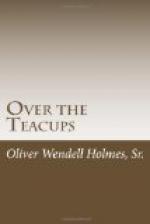The golden rule should govern us in dealing with those whom we call unbelievers, with heathen, and with all who do not accept our religious views. The Jews are with us as a perpetual lesson to teach us modesty and civility. The religion we profess is not self-evident. It did not convince the people to whom it was sent. We have no claim to take it for granted that we are all right, and they are all wrong. And, therefore, in the midst of all the triumphs of Christianity, it is well that the stately synagogue should lift its walls by the side of the aspiring cathedral, a perpetual reminder that there are many mansions in the Father’s earthly house as well as in the heavenly one; that civilized humanity, longer in time and broader in space than any historical form of belief, is mightier than any one institution or organization it includes.
Many years ago I argued with myself the proposition which my Hebrew correspondent has suggested. Recognizing the fact that I was born to a birthright of national and social prejudices against “the chosen people,”—chosen as the object of contumely and abuse by the rest of the world,—I pictured my own inherited feelings of aversion in all their intensity, and the strain of thought under the influence of which those prejudices gave way to a more human, a more truly Christian feeling of brotherhood. I must ask your indulgence while I quote a few verses from a poem of my own, printed long ago under the title “At the Pantomime.”
I was crowded between two children of Israel, and gave free inward expression to my feelings. All at once I happened to look more closely at one of my neighbors, and saw that the youth was the very ideal of the Son of Mary.
A fresh young cheek whose olive
hue
The mantling blood shows faintly
through;
Locks dark as midnight, that divide
And shade the neck on either side;
Soft, gentle, loving eyes that gleam
Clear as a starlit mountain stream;
So looked that other child of Shem,
The Maiden’s Boy of Bethlehem!
—And thou couldst scorn
the peerless blood
That flows unmingled from the Flood,
Thy scutcheon spotted with the stains
Of Norman thieves and pirate Danes!
The New World’s foundling,
in thy pride
Scowl on the Hebrew at thy side,
And lo! the very semblance there
The Lord of Glory deigned to wear!
I see that radiant image rise,
The flowing hair, the pitying eyes,
The faintly crimsoned cheek that
shows
The blush of Sharon’s opening
rose,
Thy hands would clasp his hallowed
feet
Whose brethren soil thy Christian
seat,
Thy lips would press his garment’s
hem
That curl in wrathful scorn for
them!
A sudden mist, a watery screen,
Dropped like a veil before the scene;
The shadow floated from my soul,
And to my lips a whisper stole:
—Thy prophets caught
the Spirit’s flame,
From thee the Son of Mary came,
With thee the Father deigned to
dwell,
Peace be upon thee, Israel!




